- Home
- Sharon Shinn
Troubled Waters Page 5
Troubled Waters Read online
Page 5
Nevertheless, Zoe was wearing some of her oldest clothes, and her thickest pair of shoes, when she joined Darien in the common room late the next morning. He frowned as he looked her over.
“Why didn’t you put on one of your new outfits?” he asked. “That green one was particularly pretty.”
Zoe curled up in one of the plush chairs and waited for him to bring her a plate of food. He had done so every morning. She kept expecting him to make some kind of pointed remark, like, “I am not in this coach to wait on you. Why don’t you feed yourself?” But it hadn’t seemed to occur to him, even though he did not seem like the kind of man who habitually served others. He either thought she was so helpless she couldn’t care for herself, or so precious she shouldn’t have to.
Or so stupid she would waste away if no one looked after her.
Or so indifferent to life that she would just as soon starve as not.
Indeed, in about two minutes he carried over a plate of bread and eggs and sliced oranges. They had been out of fruit last night; the coach must have made a stop this morning while she was still asleep. “Also, the red tunic was very nice with those blue trousers,” he added, taking a seat across from her.
“The material is too thin,” she said. “I’d be cold. I’ll change before we get to the palace.”
“We should be there by late afternoon,” he said.
“And I’ll have to wear my old shoes,” she added.
Because of course it was raining. The new soft leather shoes would melt before she took five steps from the carriage to the door.
“Wear the new ones,” he said. “I’ll carry you through the puddles myself.”
But she hadn’t bothered to put on any of her new finery by the time they pulled into the city limits. And at that point, Zoe was too dazzled and delighted to think about going back to her bedroom and changing.
Instead, she knelt in a sturdy chair and peered out one of the windows set into the coach walls, folding the shutters back so she could see. The rain was warm and misty, shrouding the whole city in a soft, romantic fog, and she just stared.
She remembered that deep, murky canal that curved three-quarters of the way around the city, crossed in five places by wide bridges. She remembered the low, rosy-blond granite of the foothills that stood guard at the northern border of Chialto. She remembered how that landscape changed colors as the sun changed its angle, icy taupe in bright morning, warm cinnamon at sunset. She remembered the irregular horizon line of the buildings, crowded and sooty in the outer ring of the city, taller and more gracious in the center, where the wealth and commerce of Chialto were concentrated. And there was the palace, an impressive, crenellated structure of golden stone, posing on a wide plateau halfway between the mountain peak and the flat ground of the city—visible from all points, beautiful from every view.
And she remembered the river.
It plunged down the mountaintop in a spectacular fall of foaming white, calmed itself to blue in a wide pool that glittered just beyond the palace courtyard. A much more sedate drop brought it to the deep channel that lined Chialto’s eastern border, and then it made a leisurely loop to connect to the canal before it gathered its strength and hurried southward toward the sea.
“The waterfall is so beautiful,” she murmured, resting her chin on her crossed arms where they lay on the narrow sill. The air working its way inside was damp and chilly; she had wrapped herself in her warm shawl, but she could still feel the cold along her shoulders. “But it looks smaller, somehow. I remembered the river as broader and more—ferocious.”
“I told you,” Darien said. “There has been such drought for two years that the river has shrunk in its banks.”
She felt a twinge of alarm. A complicated system of aqueducts brought fresh water to every neighborhood; the Marisi River supplied all of Chialto’s needs. “Is it so low that anyone is worried?” she asked.
“Not yet,” Darien said. “And since it seems like it’s been raining for the past nineday, I expect the levels will rise.”
They had crossed the canal at one of the southwestern bridges, so they would have to traverse virtually the entire city before making it to the winding, steeply ascending road that would take them to the palace. The first couple of miles were the diciest, as they moved through the crowded neighborhoods just past the canal. Here in the southern district, the streets were too narrow, the buildings too close together. The whole place had a discarded, noisome feel, like an abandoned house where neighbors had tossed their unwanted junk to rot, and dangerous, half-broken weapons moldered in the corners. When she was a child, Navarr had made it very plain that Zoe was never to visit the southern neighborhoods, which were full of desperate women, unscrupulous men, and lost children. Even now she felt a thrill of danger as their large, ungainly vehicle made its slow passage down these undesirable streets.
She imagined that even Darien Serlast breathed a little more easily once they turned onto the broad drive of the Cinque, which served as the border between the slums and the more civilized portions of Chialto, at least in this part of town. In fact, the five-sided boulevard looped around the entire city and carried the bulk of Chialto’s daily traffic. Unfortunately, that meant it was always clogged with carts and coaches and pedestrians, and today was no exception. The elaymotive managed little more than a crawling forward motion, giving Zoe plenty of time to stare.
On the inner edge of the Cinque, she could spot the beginnings of the nicer neighborhoods, the houses owned by merchants and tradesmen and bankers. They were mostly tall, mostly stone, and invariably well-kept. At the northern boundary of the city, she knew, would be clustered the private houses, the sumptuous mansions where the Five Families lived. Darien’s carriage would have to drive right through that neighborhood on its way to the palace.
But first it would have to get clear of this district. Traffic had come to a complete standstill, and through the open window, Zoe could hear the irate shouts of one of their own drivers. “Out of the way! We’re on the king’s business!”
Darien came to stand behind Zoe and stare out over her shoulder. “What’s the problem?”
“I think a cart has just stopped in the middle of the road. We’re too big to drive around it like the smaller wagons can.” She glanced back at him. “I don’t think we’ll be moving anytime soon.”
“We certainly will,” he said, and strode toward the door. Quickly lowering it to the ground, he took the stairs in two hops and fought through the crowd to deliver a stern order to the men who had abandoned their wagon.
Zoe moved away from the window and stood very still for a moment, considering that open door. Then she lifted the bright scarf to protect her hair from the rain and stepped outside, carefully negotiating the unfolded steps. Darien was still arguing with the drivers. She turned away from him and mingled with the crowd, instantly becoming a part of the busy, bustling tide of humanity. Within a few paces, she knew, her figure was completely lost to view. She did not once look back.
FOUR
Sunset on the banks of the Marisi River presented Zoe with a perfect image of peace.
Once the rain stopped, life in Chialto, even for a vagabond, could be very pleasant indeed. Here in the opening days of Quinncoru, the sun spent all day heating the huge, flat stones that lined the southwestern edge of the river, so they were warm enough to lie on comfortably at night.
The city’s poor gathered on the riverbank to sleep.
It was something Zoe had remembered from her long-ago life in the city. An entire community lived in this corner of the city, camped upon the stone apron that ran for almost a half mile along the edge of the river. The wide, flat space had been hollowed out alongside the river nearly a hundred years ago, a place for the floodwaters to spill when there was too much rain. No one was allowed to build any permanent structure here. It was just a big vacant stretch of stone—Chialto’s own kierten, some arch political observer had said once. Proof of the city’s wealth.
&nb
sp; So it was empty; its slight depression below the rest of the city foundation protected it from wind and weather; and it had unending access to water. Inevitably, it collected its own ragged tenants, all of them poor and with no other homes to go to—hundreds on an average day, more during seasons with kinder weather. A complex system of rules governed behavior among the squatters who made their homes along the flats. Everyone knew you scooped drinking water from the upper reaches of the river, did your bathing in the middle section, and threw refuse in the very last few feet before the Marisi went rushing south.
There was surprisingly little crime along the river, mostly because the squatters had nothing to steal, and a loose sense of community. The residents looked out for each other, sharing food when they had it, sympathy when they didn’t. There were women who acted as nurses and midwives when medical emergencies arose. There were men who patrolled the flats daily, making sure no one grew too rough, though you had to pay them a few coppers every nineday to make sure you were one of the ones they watched out for.
All of them had a love for the river. It was said not a soul camped out on the Marisi who was not coru to the core.
Zoe and her father had spent a couple of ninedays with the river squatters shortly after he’d lost the house, lost his position, lost everything. At the time, she had thought it was rather an adventure, sleeping outside by the river in the hot, dreamy nights of Quinnatorz. Navarr had been preoccupied, absentminded, but not particularly unhappy during that period of time, at least as she remembered it. Later she had realized that he must have known his fall from grace was coming; his worst days had been the ones leading up to the ouster. Once he had actually been stripped of his money and his power, he had not seemed to mind so much. He had said once, “There is a kind of glory in freedom, which to me is wholly unexpected.” She hadn’t really known, at the time, what he meant.
But Zoe had never forgotten those nights at the river.
And now that she was back in Chialto with a desperate need for haven, she remembered that city on the bank of the Marisi.
Stepping out of the elaymotive had been an act of sheer impulse; she had no plan. Should she go to her aunt’s house and ask for succor? Seek out her father’s brother and hope for rescue? Continue on to the palace and fling herself at Darien Serlast’s feet, begging for mercy? Stop at a temple and pray for guidance?
The last time she had stepped inside a temple, all the guidance she had received was the word surprise. She supposed, after all, the blessing must be read as true. This time, she had even surprised herself.
After a few hours of drifting through the streets, pausing in doorways, and reacquainting herself with the city, Zoe was cold, tired, and extremely thirsty. That was when she thought of the river—and the little city that gathered on the flats.
So, as sunset drew near on that first day, she made her way cautiously to the southern edge of town and the great, flat bowl of stone that seemed to offer the hope of safety. And she stepped up to the lip of the depression and gazed down at the colorful patchwork of mats, tents, drying clothes, running children, and sparkling fires, and felt her face curve into a smile. The river, broad and lazy in its perfectly carved channel, was so red with sunset that it appeared to have been painted with a prodigal hand. She set her feet on the hard-packed path that led from the edge of the city and headed down without a moment’s hesitation.
That first night she paid a few coins to the river patrol and then bedded down on the flats with nothing but her scarf to keep her warm. She was chilly and hungry, but at least the rain had stopped. When she woke the next morning, stiff, sore, and a little disoriented, she found that someone had left two oranges and a wrapped loaf of bread by her head. She was hungry enough to devour the food immediately, all the while looking around to see if anyone came forward to claim the kindness. No one did.
Once she had eaten, she took a few minutes at the river’s edge to wash her face and try to comb some order into her tangled black hair. Then she sat for a while regarding her reflection in the rippling water.
She couldn’t count on anonymous offerings of food every day, and she would grow ragged and grimy very quickly if she did not have another change of clothes soon. No matter how long or short her stay here in the river community, she would need a few essentials to make her life agreeable, and eventually she would have to come up with a more permanent plan.
But not today. Today she merely had to figure out how to survive until tomorrow.
There was no hope of privacy along the river flats, so Zoe climbed back into the city proper and wandered, looking for a doorway or a culvert where she might be unobserved for five minutes. Finally she found a damp, shadowed alley where a row of merchants dumped their trash, and she flattened herself against a wall that had no windows. It was the work of a few moments to slit one of the seams in her wool scarf and catch a coin as it slid into her hand.
It was a gold piece, the largest possible denomination. A careful woman could live for a quintile or longer on such a coin, if she needed nothing but food. Zoe had fifty of these coins sewn into the border, each one in its own secure pocket so that they did not all come clattering out at once.
Of course, dressed as she was, she could not spend such a coin in any respectable outlet. She would be instantly branded a thief and hauled before the city guards—and, almost as quickly, turned over to Darien Serlast. No doubt he had lodged her description with every authority in the city. She needed to find a moneychanger, someone with flexible standards and a complete lack of curiosity.
Wrapping the shawl more tightly around her shoulders, Zoe exited the alley and headed straight toward the Plaza of Men.
The heart of Chialto was the shop district, which featured dozens of specialized boutiques that had, in many cases, stood in the exact same spots for hundreds of years, run by an unbroken succession of merchant families. But the Plazas, one on each end of the shop district, formed the two halves of the city’s soul.
It was relatively easy to navigate the city, since a variety of public transport vehicles made a continuous circuit around the Cinque. Zoe found her way onto a crowded horse-drawn omnibus, but traffic was thick with small carriages for hire and a few smoker coaches that looked big enough to haul fifty people at a time. The Plaza of Men was at the northern edge of the shop district, so the ride was long, though endlessly interesting. Zoe watched the neighborhoods unroll on either side of her, the poor, disreputable homes on the outer edge of the boulevard, the fancier, prettier ones on the inside. Not wanting to ask anyone for directions, she guessed at which stop was closest to the Plaza, and ended up having to walk a good two miles before arriving at her destination.
Despite its name, the Plaza of Men was full of traders happy to do business with women. It was just that more of their enterprises happened to appeal to the other sex. A handful of permanent, semi-open structures delineated the outer perimeter of the Plaza. One was the betting booth, which had been there ever since Zoe could remember. There, clients could enter wagers on any possibility that intrigued them: from how many children King Vernon might sire to how many women they might induce to kiss them before the day was over. It was said that the family who owned the booth kept leather-bound books with the records of all the bets made there for more than two hundred years.
Another enterprise that had been at the Plaza for centuries was the promise booth, where a man might swear before witnesses he would achieve a certain task by a certain time, or stand with a potential employer to agree to a set of tasks and a code of conduct. Nearby were three or four horse-seller stalls, two very large swapping tables, and metalworking outfits that would repair knives and jewelry.
Clustered in the middle of the Plaza were the more transient purveyors of services that might have some masculine appeal. Most of these merchants were sitting or standing beside wheelbarrows or small carts with huge wheels. Some were entrepreneurs looking for financial backers. Some were politicians trying to drum up interest in their cau
ses. Some were scribes or accountants, selling their services. Some were moneylenders. Some were moneychangers.
Zoe was not in any particular hurry, so she lingered for a few minutes before each of the moneychangers, eavesdropping on their conversations with other customers. Her goal was to find one who would be fair, if not scrupulously honest—one who would give her good value for her coin without wondering too hard where she had acquired it.
Eventually she chose an older fellow with rumpled gray hair, a rumpled reddish face, and rumpled clothes. “I’d like to change this into coins of smaller denominations, please,” she said, handing over the gold piece.
He shot her one quick look, inspected the coin closely for authenticity, then named a sum on the low end of her acceptable range. “And that’s firm,” he added. “But I’ll throw in a leather purse if you want it. Long strap. You can wear it under your clothes so it won’t get snatched.”
It hadn’t even occurred to her to wonder how she would carry around a large pile of small coins, so her opinion of the moneychanger went up a notch. “Thank you,” she said. “Let’s do business.”
He stacked up the copper and silver coins for her—quite a lot of them—and let her count them before sweeping them into the sturdy bag. “If you find yourself with more golds like that,” he said, “I’ll be happy to change them, too.”
She slipped the strap over her head and settled the bag on her hip, where it was mostly covered by the shawl. “I’ll look for more, then.”
Now that she had money in reasonable denominations, she could make a few necessary purchases. First, of course, was food; except the bread and fruit, she’d eaten nothing for a nearly a day and a half. Some of the vendors at the Plaza of Men sold meat on a stick and fried bread and huge, misshapen apples that tasted sweeter than honey. Zoe kept a few coins in her pockets so she didn’t have to draw attention to the purse. Everything was cheap and tasted wonderful.

 Jenna Starborn
Jenna Starborn Troubled Waters
Troubled Waters The Thirteenth House
The Thirteenth House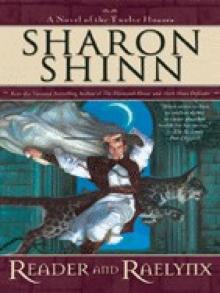 Reader and Raelynx
Reader and Raelynx Angel-Seeker
Angel-Seeker Archangel
Archangel Jeweled Fire
Jeweled Fire Nocturne
Nocturne The Shape-Changer's Wife
The Shape-Changer's Wife Still Life With Shape-Shifter
Still Life With Shape-Shifter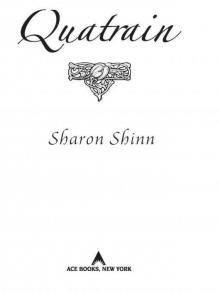 Quatrain
Quatrain Fortune and Fate
Fortune and Fate Angelica
Angelica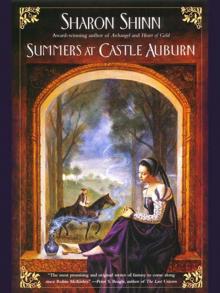 Summers at Castle Auburn
Summers at Castle Auburn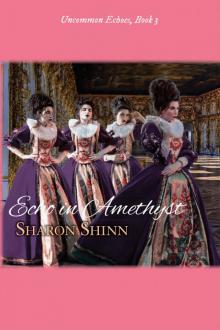 Echo in Amethyst
Echo in Amethyst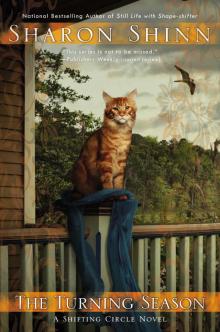 The Turning Season
The Turning Season Mystic and Rider
Mystic and Rider Heart of Gold
Heart of Gold The Shape of Desire
The Shape of Desire Echo in Onyx
Echo in Onyx Royal Airs
Royal Airs Gateway
Gateway The Safe-Keeper's Secret
The Safe-Keeper's Secret Wrapt in Crystal
Wrapt in Crystal Unquiet Land
Unquiet Land Jovah's Angel
Jovah's Angel Dark Moon Defender (Twelve Houses)
Dark Moon Defender (Twelve Houses) Mystic and Rider (Twelve Houses)
Mystic and Rider (Twelve Houses) Fortune and Fate (Twelve Houses)
Fortune and Fate (Twelve Houses)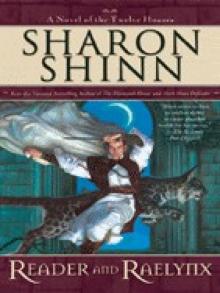 Reader and Raelynx (Twelve Houses)
Reader and Raelynx (Twelve Houses)